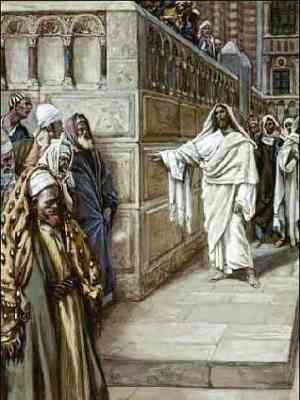In the previous two posts we have looked at the poor widow who gave her last two coins to the temple, and what Jesus thought about this. He was saddened that the temple leadership had degenerated into stealing from the poor, rather than helping the poor as they were supposed to be doing.
The widow should not have given to the temple. The temple should have given to her.
Can the Rich Give to the Temple?
If this is the case with the widow, what did Jesus think about the wealthy people giving to the temple? It seems that Jesus did not want the rich to give to the temple either.
Jesus is not too concerned about their wealth (except that maybe some of them had gained their riches through devouring widow’s houses), nor even with how much they are giving to the temple. Jesus is primarily concerned with the fact that they are giving to the temple.

Here is this poor widow in their midst, who has no home, and has only two pennies left to her name, and all the wealthy people are generously giving to the temple, but should be giving some of their money to her.
I think that Jesus would say that this widow is more important than any temple.
The rich should give to the poor; not to the temple.
The Rich Should Give to the Poor
How can I say this?
Immediately after this event, the disciples of Jesus ask Jesus about the temple, and Jesus says it is all going to be destroyed (Mark 13:1-2). It is beyond imagination that Jesus could be praising anybody for giving money of any amount to a building and institution that was about to be destroyed! It is much better, Jesus would say, to give to the poor, the needy, and destitute, than to a building and religious system that was about to be destroyed.
Where Should the Wealthy Give?
 So what application can we pull from this passage? First, let us consider the giving from the wealthy people. Jesus nowhere condemns their wealth. It is not a sin to be wealthy. Also, it does not appear that Jesus is too concerned about the amount they give.
So what application can we pull from this passage? First, let us consider the giving from the wealthy people. Jesus nowhere condemns their wealth. It is not a sin to be wealthy. Also, it does not appear that Jesus is too concerned about the amount they give.
It seems more likely from the context that Jesus is concerned about what they were giving to. They were giving to a corrupt and condemned institution where the funds were spent not on taking care of the poor and needy in the community, but on providing fancy clothes and sumptuous feasts for the spiritual leaders.
Now, having said that Jesus seems to be ambivalent about how much money these wealthy people had and how much of it they were giving to the temple (which was probably 10%), this does not mean that Jesus didn’t have something to say on the subject.
Just as He thought it was tragic that the widow was giving money to the temple, He also seems to think that the wealthy should not have been giving to the temple either, especially when you consider how the temple was improperly spending the money.
But this does not mean that the wealthy should be given a free pass to hoard all their wealth, and spend 100% of it on themselves. No, Jesus had plenty of things to say about what the wealthy should do with their money. One of the greatest examples of His teaching on money is His encounter with the Rich Young Ruler, which we will look at on Wednesday.




Am I correct in understanding that not only should the rich have been giving to the poor (rather than devouring widow’s houses), but also the temple should have been forwarding part of the money given them to the poor? Was not that what money placed into one or more of those containers was supposedly intended for?
Tithing is not mandatory for Christians. A significant portion of money given to churches should not be for their use but should be given to the poor. As followers of Jesus, we should give to the poor, including widows, orphans and others. Might we suppose that each of these ideas could be called “An Inconvenient Truth” in our present day churches?
In my reading of the use of the tithe from the Hebrew Scriptures, that is the way I understand it. The rich are supposed to give to the poor, AND the temple leadership is to make sure that the poor in the community are taken care of out of the tithe income they receive.
Now again, we are not under the Mosaic law, but I find it so ironic that churches and pastors want to teach the tithe from the Hebrew Scriptures, but then ignore what some of the tithe was supposed to be used for.
I have never seen this interpretation before, but it does seem to be more in alignment with the rest of what Jesus says than the “traditional” version we all know.
I think so, too. Both the preceding and following context seem to indicate this reading.
I will not be labeled a tither. Our blessings are not predicated on paying 10%. There are no ordained Levitz or temple Priest. The churches are bringing in millions but not helping those that are poor in the community. I’m never going to be reduced to feel guilty because of 10% the modern day church make you believe you have to pay. I’m going to remain a cheerful giver.
The temple should give to the poor the rich should give to the temple God says bring the whole tithe into the store house that there may be food in my house then he will bless us the tithe is used to keep the doors open to the church where we can get true food spiritual food that’s the reason for the tithe we will always have the Poor amongst us Jesus will one day come back and leave for the finale time Come to Jesus while you still can